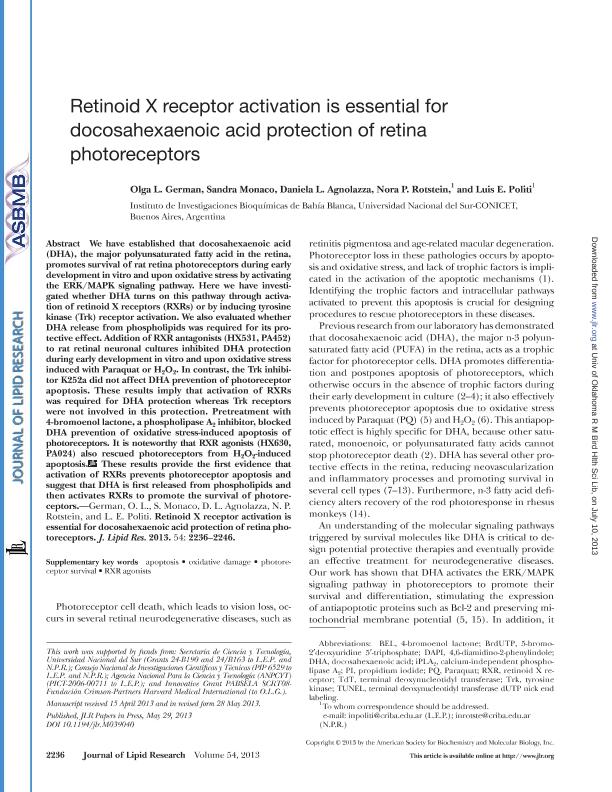Artículo
Retinoid X Receptors Activation is Essential for Docosahexanoic Acid Protection of Retina Photoreceptors
German, Olga Lorena ; Monaco, Sandra Tanya
; Monaco, Sandra Tanya ; Agnolazza, Daniela Luciana
; Agnolazza, Daniela Luciana ; Politi, Luis Enrique
; Politi, Luis Enrique ; Rotstein, Nora Patricia
; Rotstein, Nora Patricia
 ; Monaco, Sandra Tanya
; Monaco, Sandra Tanya ; Agnolazza, Daniela Luciana
; Agnolazza, Daniela Luciana ; Politi, Luis Enrique
; Politi, Luis Enrique ; Rotstein, Nora Patricia
; Rotstein, Nora Patricia
Fecha de publicación:
05/2013
Editorial:
American Society For Biochemistry And Molecular Biology
Revista:
Jlr Papers In Press
ISSN:
0022-2275
e-ISSN:
1539-7262
Idioma:
Inglés
Tipo de recurso:
Artículo publicado
Clasificación temática:
Resumen
We have established that docosahexaenoic acid (DHA), the major polyunsaturated fatty acid in the retina, promotes survival of rat retina photoreceptors during early development in vitro and upon oxidative stress by activating the ERK/MAPK signaling pathway. We now investigated whether DHA turns on this pathway through activation of retinoid X receptors (RXR) or by inducing tyrosine kinase (Trk) receptor activation. We also evaluated whether DHA release from phospholipids was required for its protective effect. Addition of RXR antagonists (HX531, PA452) to rat retinal neuronal cultures inhibited DHA protection during early development in vitro and upon oxidative stress induced with paraquat or H2O2. In contrast, the Trk inhibitor K252a did not affect DHA prevention of photoreceptor apoptosis. These results imply that activation of RXR was required for DHA protection whereas Trk receptors were not involved in this protection. Pretreatment with BEL, a phospholipase A2 inhibitor, blocked DHA prevention of oxidative stress-induced apoptosis of photoreceptors. Noteworthy, RXR agonists (HX630, PA024) also rescued photoreceptors from H2O2-induced apoptosis. These results suggest that DHA is first released from phospholipids and then activates RXR to prevent photoreceptor apoptosis. This is the first evidence in which RXR activation can promote the survival of photoreceptors.
Palabras clave:
Photoreceptors
,
Rxr Agonists
,
Docosahexaenoic Acid
,
Apoptosis
,
Oxidative Damage
Archivos asociados
Licencia
Identificadores
URL:
http://www.jlr.org
Colecciones
Articulos(CCT - BAHIA BLANCA)
Articulos de CTRO.CIENTIFICO TECNOL.CONICET - BAHIA BLANCA
Articulos de CTRO.CIENTIFICO TECNOL.CONICET - BAHIA BLANCA
Articulos(INIBIBB)
Articulos de INST.DE INVEST.BIOQUIMICAS BAHIA BLANCA (I)
Articulos de INST.DE INVEST.BIOQUIMICAS BAHIA BLANCA (I)
Citación
German, Olga Lorena; Monaco, Sandra Tanya; Agnolazza, Daniela Luciana; Politi, Luis Enrique; Rotstein, Nora Patricia; Retinoid X Receptors Activation is Essential for Docosahexanoic Acid Protection of Retina Photoreceptors; American Society For Biochemistry And Molecular Biology; Jlr Papers In Press; 54; 5-2013; 2236-2246
Compartir
Altmétricas



